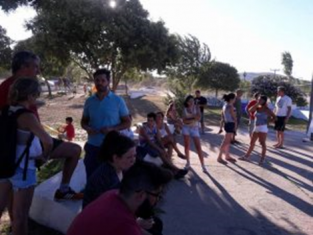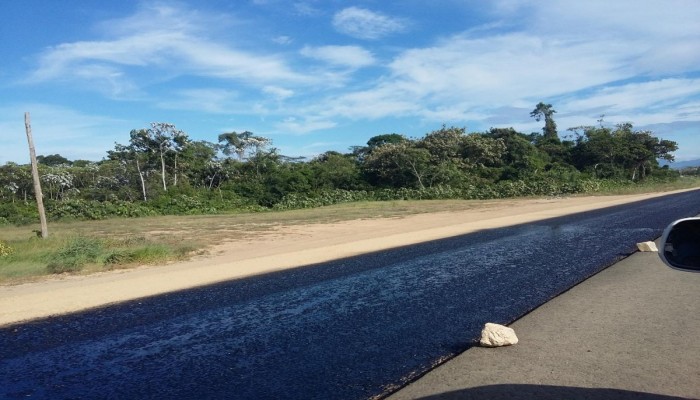Within the long list of Chinese investments in Argentina, the case of aqueducts in the province of Entre Ríos has been one of the most controversial. Irregularities in the bidding process, approval and execution of the project have aroused the suspicion and the demands of various sectors of civil society.
“Below, we offer a google translate version of the original article in Spanish. This translation may not be accurate but serves as a general presentation of the article. For more accurate information, please switch to the Spanish version of the website. In addition, feel free to directly contact in English the person mentioned at the bottom of this article with regards to this topic.”
In a changing international context, in which the most important actors have been changing, Argentina has encountered difficulties in accessing traditional sources of financing. Over the last few years, especially since the Kirchner administration, the scenario of foreign investment in Argentina has been marked by the preponderance of the PRC. Several of the major infrastructure projects that are being carried out are behind the backing of Asian companies.
There are two projects that have been working between the Nation and the province of Entre Ríos for some years and had to do with the possibility of building two aqueducts for irrigation in the north of Entre Ríos. For the construction of these, the provincial government and the China State Construction Engineering Corporation (CSCEC) signed a commitment letter for the supply of fresh water, incorporating 200,000 hectares of irrigation.
In mid-June 2013 the CSCEC expressed its interest in investing in infrastructure works in the province of Entre Ríos. During a meeting with representatives of the company, developed at the House of Entre Ríos in Buenos Aires, Governor Sergio Urribarri “proposed three basic lines of action: irrigation works, Paraná-Santa Fe metropolitan link and port development.” According to the governor, the development of the works would be linked to a great extent to increase the productive capacity of the province.
The agreement with China for the construction of the two aqueducts was signed on July 18, 2014. Within the framework of strategic agreements for infrastructure works, signed in the Casa Rosada between Xi Jinping and Cristina Fernadez de Kirchner, meeting in which Urribarri participated.
The aqueducts will have a total length of 546 kilometers between main branch and secondary branches. Two works, the first in the Arroyo Mandisoví basin in the Federation department to implement a collective irrigation system, from the Uruguay River, for rice, citrus and fruit-horticultural production. The second in the department of La Paz to build an aqueduct of the North Entre Ríos, with the contribution of water from the Paraná River and provide a marginal area of access to water for irrigation.
The costs of the works total an amount close to USD 98,000,000, according to the data presented by the “Provincial Agricultural Services Program” in its feasibility reports of which the province should contribute 20%. However, the budget of the CSCEC was USD 430,387,552 awarded without competitive bidding. Funding would come from ICBC, with a credit of USD 366 million at 15 years (with a grace period of 5) with a LIBOR rate of 4.5%. Likewise, the credit agreement provides as applicable law the same as that of England.
The project provoked rejections in some sectors, such as the organizations nucleated within the Multisectoral in Defense of the Heritage of the Entrerrianos, which promoted the nullity of the law that, among other points, enabled the direct granting, without public bidding, of the work to A Chinese capital company, as well as a debt exceeding $ 430 million. The M’biguá Foundation and Environmental Justice also warned about the lack of transparency and information about the project.

The case of aqueducts is the first to reach justice. As discussed above, the Multisectoral for the Defense of the Patrimony of the Entrerrianos presented an unconstitutionality action with respect to the law No. 10.352 that authorized the Provincial Executive to become indebted to the financial institution of China. This action is based on the fact that this law has not fulfilled the formal requirements that the provincial constitution urges for its approval, for example: there was no Environmental Impact Assessment, there is no opinion from the commissions of Finance and Economy, or the prosecution Of state, among other irregularities. The total lack of controls in the legislative process, the treatment on tables of the norm, the absence of debate on the subject and, especially, the secrecy with which the government was managed not to make known the project, is another aspect Demand.
Among the main points of the complete demand are:
– Ineffectiveness of Law 10.352 for irregularities in its processing.
– Non-observance of the principle of reasonableness.
Authorization to the Governor to agree and keep secret the contract with the Chinese Bank.
– Authorization to the Governor to contract with the Chinese Bank ICBC a loan in which Entre Ríos accepts to be governed by the English legislation.
– Violation of the constitutional duty to publicize acts of government.
– Deprivation of information as a human right.
– The previous and precautionary implementation of Environmental Impact Studies and its evaluation processes with the due Public Hearings and the dictating of the Administrative Acts prior to the authorization of contracting of the work and the authorization of the conclusion of investment agreements and / Or indebtedness.
– Violation of the Public Accounting Law. (Arrogating thus the P.E. unconstitutionally own powers of the Legislative Power).
– Violation of the Public Works Law.
– The constitutional guarantees contained in Section II – Economic, Labor and Sustainable Development of the Provincial Constitution were ignored.

According to local media: “From a commission of five million dollars that the provincial state must pay for the operation, up to the costs not calculated of interest, expropriation of land for the work and other costs, contemplating also the implementation of increases Tributary to cover the payment of the credit, the economic questions to the norm are numerous. The first of these, in any case, is the amount of the credit: nobody understands very well how the entrerriano government arrived to calculate both works by more than 430 million dollars when Prosap had budgeted, some months before, less than 100 million” .
According to Jorge Daneri, a member of the M’biguá Foundation, a package of potential mega investments in the region is being formed which, in addition to the aqueducts, would include a hydroelectric dam project between the provinces of Corrientes and Santa Fe on the northern border Of Entre Ríos. According to Dr. Daneri, the mechanism is the same in all projects: there is no parliamentary debate on the projects, let alone in the provinces involved, therefore, the silence of federalism of social consultation and citizen consultation.
From FUNDEPS we have been working on the follow-up of the case of trunk gas pipelines in the province of Cordoba, which also have Chinese funding. Part of the process of approval and execution of this project, can be identified with what happened in Entre Ríos. The lack of transparency in certain issues such as the presentation and publication of the environmental impact study, sound an alarm with respect to environmental standards and DD.HH.
In addition, we consider it of special importance to highlight that the recent importance of the People’s Republic of China in terms of investments in infrastructure projects translates into a need for civil society to monitor the design, approval and implementation processes of these projects. The irregularities mentioned above are the result of policies that still lack transparency and are not part of a accountability paradigm.
More information
A Chinese Agreement
Entre Ríos: “with the pretext of building two aqueducts is to consummate a very large swindle”
Law of aqueducts: filed suit against the “scam” of Urribarri
Law of aqueducts: the Multisectorial will collect signatures to repeal the text
Mid Paraná Dam, aqueducts and China, the spring of hope
Contact
Gonzalo Roza, gon.roza@fundeps.org





 “Below, we offer a google translate version of the original article in Spanish. This translation may not be accurate but serves as a general presentation of the article. For more accurate information, please switch to the Spanish version of the website. In addition, feel free to directly contact in English the person mentioned at the bottom of this article with regards to this topic”
“Below, we offer a google translate version of the original article in Spanish. This translation may not be accurate but serves as a general presentation of the article. For more accurate information, please switch to the Spanish version of the website. In addition, feel free to directly contact in English the person mentioned at the bottom of this article with regards to this topic”
